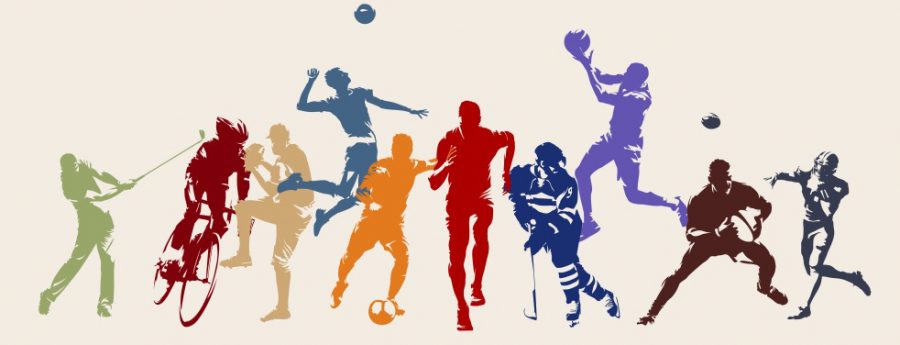Sports: a Virulent Dismissal of Patience and Caution
In such a perilous year as 2020, Americans have come to realize that they cannot go on without sports.
Amidst a global pandemic, many found themselves growing weary of idleness and redundancy, suffering an ever-increasing buildup of lethargy and listlessness. Thus, began a desperate search for a means of entertainment. This means of leisure has generally gravitated towards sports, which doesn’t mix well with a worldwide Coronavirus outbreak. As we begin to work sports into our new normal, it’s paramount that we learn discipline and empathy. In 2020, impatience and ignorance will get people killed, whereas composure and thoughtfulness can save lives.
From casual spectators to dedicated athletes, the vast majority of the American population has felt the drastic transition to life without their pastime. According to a 2008 report from the Women’s Sports Foundation, nearly 75 percent of kids from grades 3 to 12 participate on sports teams. The Gallup Poll Social Series gathered that roughly 60 percent of Americans consider themselves sports fans. Sports are indubitably significant in the American lifestyle. It’s no wonder that pandemic closures are regarded by so many as a “crisis” and a “tragedy.”
Of course, the Coronavirus pandemic is far beyond what qualifies as tragic, though the reason is not the temporary loss of sports. In fact, this is trivial when juxtaposed with the sheer loss of life in these past months. The United States alone has suffered over 200,000 deaths to COVID-19. This is a grisly number that will indisputably grow with the resumption of sports leagues. At the mercy of nature, we continue to complain about fun and games. It all stems from lack of patience and the capacity to self-sacrifice.
Trevor Lawrence, quarterback at Clemson University, has been a leading voice in advocating for college sports. Last month, he tweeted that “People are at just as much, if not more risk, if we don’t play.” Like many others exhorting the leagues to resume, Lawrence’s attitude is devoid of empathy, discipline, and logic. Playing football does not decrease risk of transmitting COVID-19, nor does it consider those vulnerable to it. An athlete can live without their sport; the same can’t be said for those who are put at risk by the Coronavirus.
Yes, sports have a positive influence on our society, and it’s good that they carry significant value for so many. However, it is important to consider what we sacrifice in hasty indulgence. It is important that we realize the inevitable spread of the coronavirus through sports, as well as the risk that sports pose to vulnerable individuals. It is important that we spread awareness in order to save lives.
Life is precious. The games can wait.
Bibliography
Gatto, Tom. “Clemson QB Trevor Lawrence Becomes a Leading Voice for #WeWantToPlay Message.” Sporting News, Sporting News, 10 Aug. 2020.
Jones, Jeffrey M. “As Industry Grows, Percentage of U.S. Sports Fans Steady.” Gallup, Gallup, 17 June 2015.
Streeter, Kurt. “’Everything Is Closed Down.’ The Lack of Youth Sports Is a Crisis.” The New York Times, The New York Times, 12 Oct. 2020.
Uzoma, Kay. “How Many Youth Participate in Sports in the U.S.?” SportsRec, Leaf Group Media, 05 Dec. 2018.


